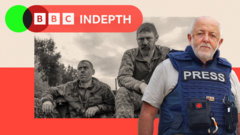Three years after the onset of war, Kyiv presents a deceptive image of normalcy. While shops bustle and traffic clogs the streets, an unsettling undercurrent surges through the city since the political embrace between US President Donald Trump and Russia's Vladimir Putin on February 12. The haunting fears of national extinction that plagued Ukrainians in 2022 have resurfaced, intensified by Trump's rhetoric, which often aligns with that of the Kremlin and dismisses Ukraine's legitimate government.
Ukrainians, once fueled by President Joe Biden’s cautious support and steadfast commitment, find themselves grappling with Trump's dismissive approach. His claims of Ukrainian leadership acting as a dictatorship and his insistence that Ukraine initiated the conflict have effectively reignited fears of abandonment. Trump’s strategy, marked by preemptive concessions to Russia and claims that Ukraine would relinquish its NATO ambitions, only exacerbates concerns.
The return of Trump to the political arena sends shivers down Kyiv's spine, as officials like adviser Ihor Brusylo highlight the oppressive pressure they face once more. Despite the added strains, Brusylo's assertions of Ukraine's determination to uphold its sovereignty are resolute, affirming its identity as a proud European nation.
Remembering the sobering days of early 2022, the haunting echo of gunfire has been replaced in part by a sense of relative calm, but at night, sirens still pierce the air, signaling incoming missile threats. Ukraine has shown resilience, but with Russian positions fortified along a lengthy frontline, the specter of violence remains ever-present.
Recent military dynamics have shifted, with Ukraine executing limited incursions into Russian territories. Yet, the escalating involvement of North Korean forces, reportedly dispatched to fight alongside Russian troops, indicates a growing complexity in the theater of war. Amidst this inference, soldiers like Corporal Evhen express that they are prepared to fight without an indefinite dependence on US support, encouraging a drive for Ukrainian self-sufficiency in military capabilities.
Many returning veterans and recruits explore the psychological toll of warfare, feeling a need for renewed mobilization that echoes sentiments from the past. For young fighters like Maxsym and Dmytro, memories of impulsive enlistment have paved the way for a profound reckoning, sparking comparisons to historical missteps by Western leaders, implying that a similar error of judgment looms over modern diplomatic engagements with aggressors like Putin.
The conundrum of Trump's unpredictable foreign policy combines with Ukraine's persistent resolve. With echoes of sovereignty's value against an encroaching Kremlin threaten once more, the interplay of geopolitical ambitions and wartime realities places Ukraine at a pivotal juncture. As they face the looming storm, their reflections reveal a nation molded by struggle, ready to confront the uncertainties ahead.





















